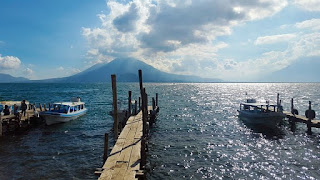By Clay Larroy
It doesn't matter if you take a trip across
the state line or the border, being far from home can be exciting and also a
bit stressful. When considering traveling, it is important to think of the best
mode of travel. Traveling by car can offer many more
sights and opportunities for side trips. Traveling by train can offer a chance
to relax and get some work done if they wanted. Planes can cover ground fast
but don't allow much movement and one cannot get off the plane in flight. Each
mode of travel has its own advantages and disadvantages to be considered. When you want
to plan a vacation contact me!
Customs in Guatemala
It is very common to greet most people, especially in the countryside.
Clothing need not be too conservative, however, modesty is advised for female travelers
in order to avoid unwanted attention. Ask permission before taking photographs, particularly of children, as local people are
suspicious of foreigners approaching children for pictures due to incidences of
child kidnapping, particularly in remote areas where tourists have been
attacked. A small tip might be required. Military clothing is illegal, so avoid
camouflage-patterned clothing. Public displays of affection between same sex
couples should be avoided, particularly outside of Guatemala City.
Duty Free in Guatemala
Travelers to Guatemala over 18 do not have to pay duty on 500g of
tobacco in any form and five liters of liquor or spirits.
Doing Business in Guatemala
Business etiquette in Guatemala is similar to the rest of Latin America.
Due to the warm, humid climate men often wear lightweight suits and women
should wear a dress or a skirt with a blouse. Always be punctual for meetings,
as Guatemalan business people are very punctual. Use professional titles such
as such as 'Doctor', 'Professor', 'Ingeniero' (engineer) or 'Abogado' (lawyer),
otherwise address colleagues as Señor (Mr), Señora (Mrs) and Señorita (Miss),
followed by their last names. Speaking softly is considered polite. Business
cards may be exchanged although there is no ritual around it. Business hours
are generally 8am to 5pm, Monday to Friday, with an hour taken over lunch and
business lunches or breakfasts are preferred over business dinners.
Communication in Guatemala
The international access code for Guatemala is +502. The outgoing code depends on what network is used to dial out on, which is followed by the relevant country code (e.g. +44 for the United Kingdom). City codes are not required. There are generally surcharges on calls made from hotels and it is cheaper to use calling cards. Rates are generally less expensive after 7pm. Internet cafés and wifi connections are available in the cities and main tourist areas and many hotels, hostels and language schools will offer reasonable internet rates. Public phones require a call card and it may work out cheaper to use a call card for all calls, both local and, especially,
international calls.
Tipping in Guatemala
Generally, a 10 percent tip is recommended for good service in
Guatemala. It is customary to tip waiters if a service charge hasn't been added
to the bill and tipping extra for excellent service is also customary. Taxi
drivers are not usually tipped. Hotel staff and tour guides expect to be tipped for
their services and can be more favorable in their service when receiving
generous tips.
Passport/Visa Note
It is strongly recommended that all foreign passengers to Guatemala hold return or onward tickets, and the necessary travel documentation for their next destination. Note that the period of stay for visa-exempt nationals is 90 days; however, 90-day extensions can be organized through the Immigration Office. For nationals requiring a visa, the consulate issuing the visa will advise visitors about the amount of deposit to be paid at the port of entry in Guatemala, which will be refunded when the visitor leaves Guatemala.
NOTE: It is highly recommended that your passport has at least six months
validity remaining after your intended date of departure from your travel destination.
Immigration officials often apply different rules to those stated by travel
agents and official sources.
REFERENCE SITES:
http://www.travelresearchonline.com/


No comments:
Post a Comment